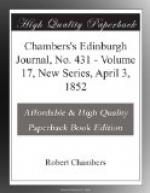THE OASES OF LIBYA.
Nought wholly waste or wretched
will appear
Through all the
world of Nature or of mind;
Hope’s tender beamings
soften Sorrow’s tear,
The homeless outcast
happy hours will find:
To polar snows the Aurora-fires
are given,
The voice of friendship
cheers the groping blind;
The dreary night hath stars
to deck the heaven;
One law prevails
beneficently kind:
E’en not all darkness
is the silent tomb,
Faith points to bowers of
bliss beyond the gloom.
So, Libya, in thy wide and
fiery waste,
Gladdening the
traveller, plots of verdure lie,
As if, when demons thence
all life had chased,
They dropped in
beauty from the pitying sky.
How weary pilgrims, dragging
o’er the plain,
When first green
Siwah’s valleys they espy,[1]
Cast off their faintness!
swiftly on they strain,
Drinking sweet
odours, as the breeze floats by:
They see the greenery of the
swelling hills,
They hear, they hear the gush
of bubbling rills!
Oh! beautiful that soul-enchanting
scene!
The fresh leaves
twinkling, and the wild-birds singing;
The rocks so mossy, and the
grass so green,
From tree to tree
the vine’s young tendrils swinging:
Fruits of all hue—pomegranate,
plum, and peach,
Tempting the eye,
and thoughts luxurious bringing;
Flowers of all breath that
each stray hand may reach,
The glittering
bee among them blithely winging:
While skies more clear, more
bluely seem to glow,
To match the bright and fairy
scene below.




